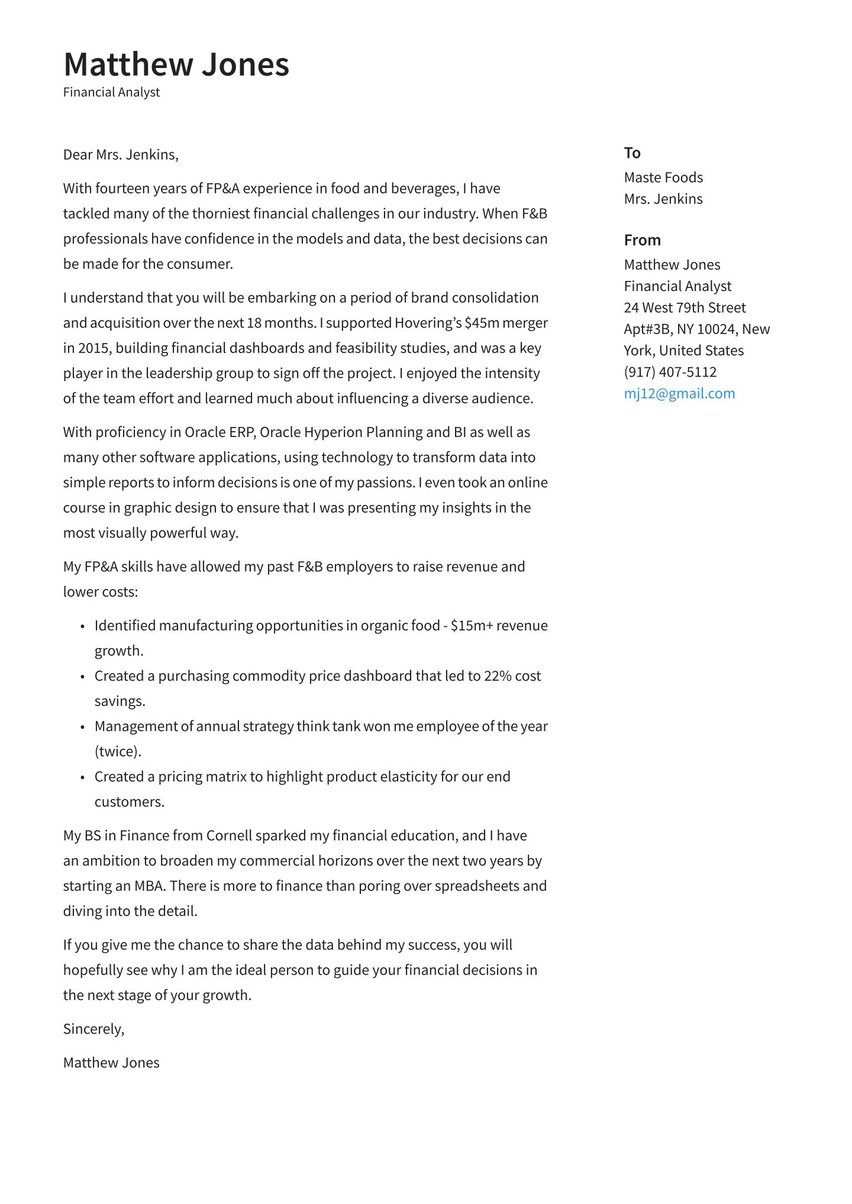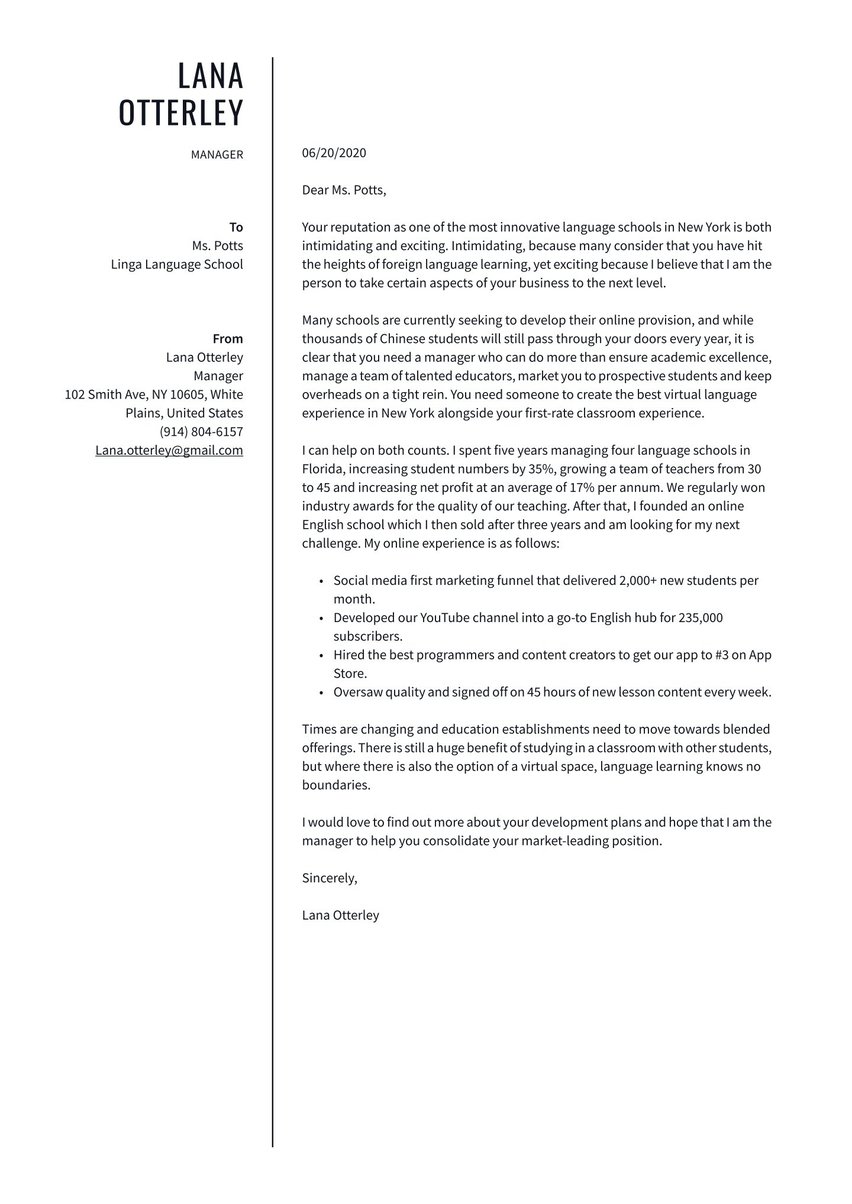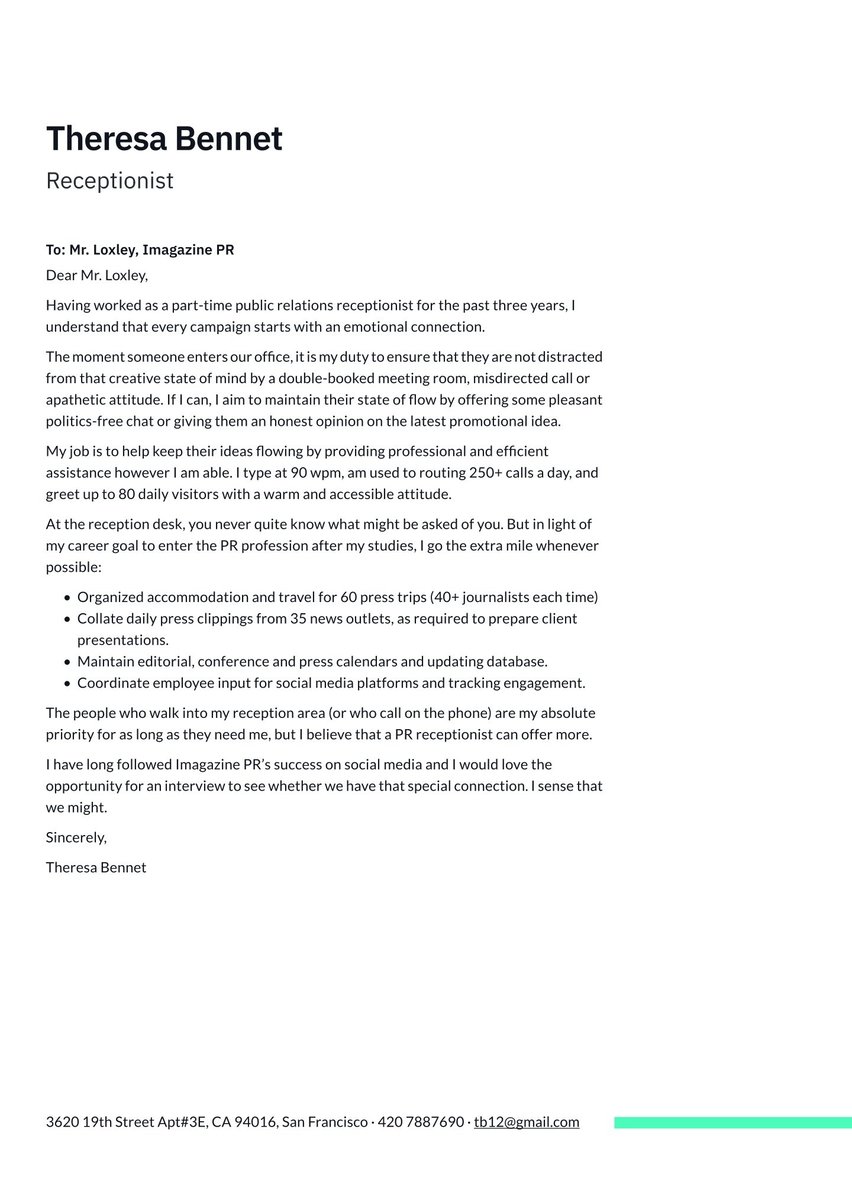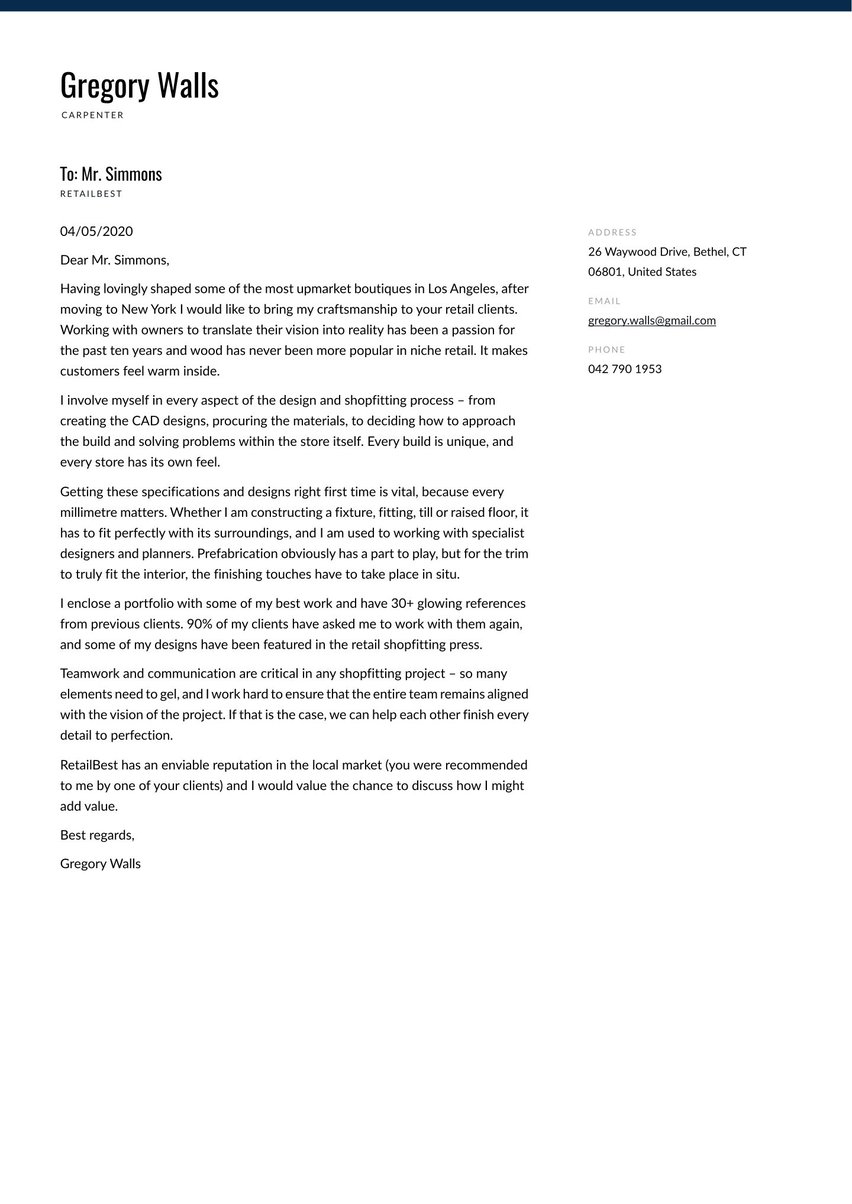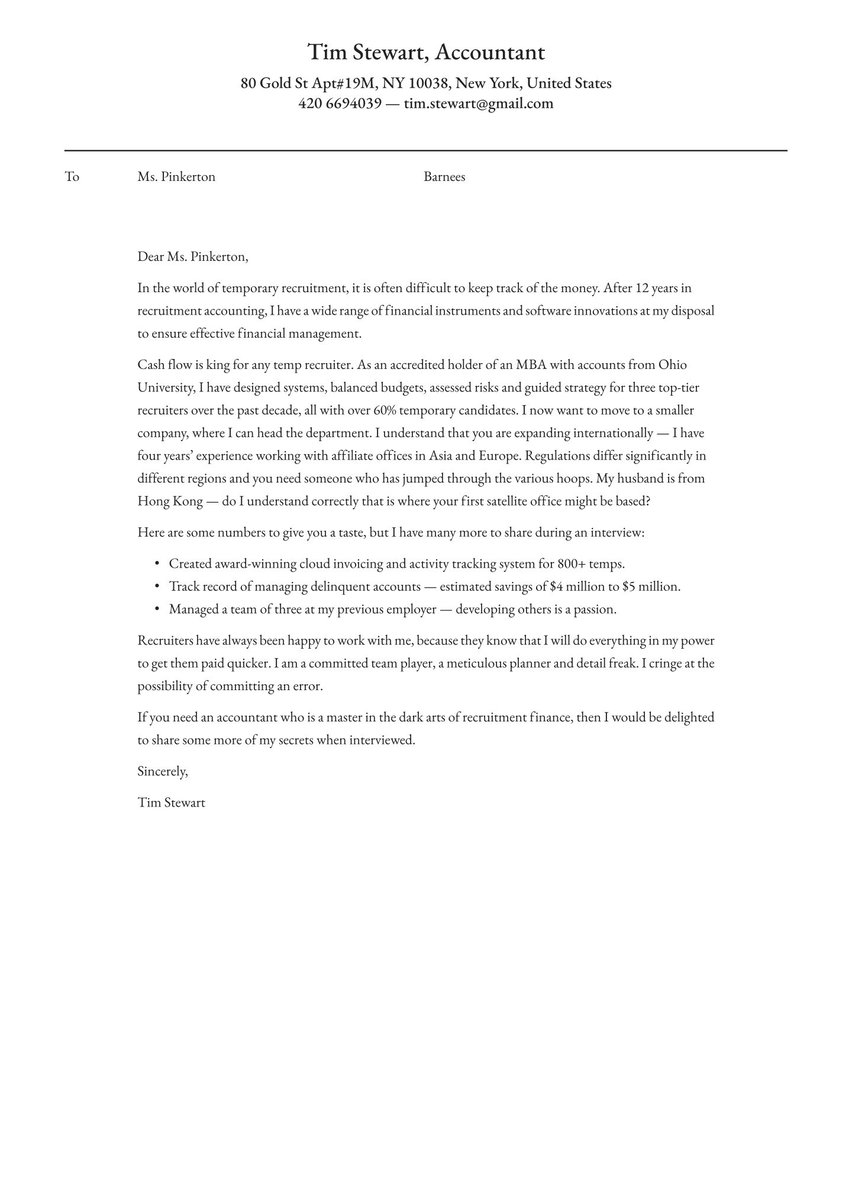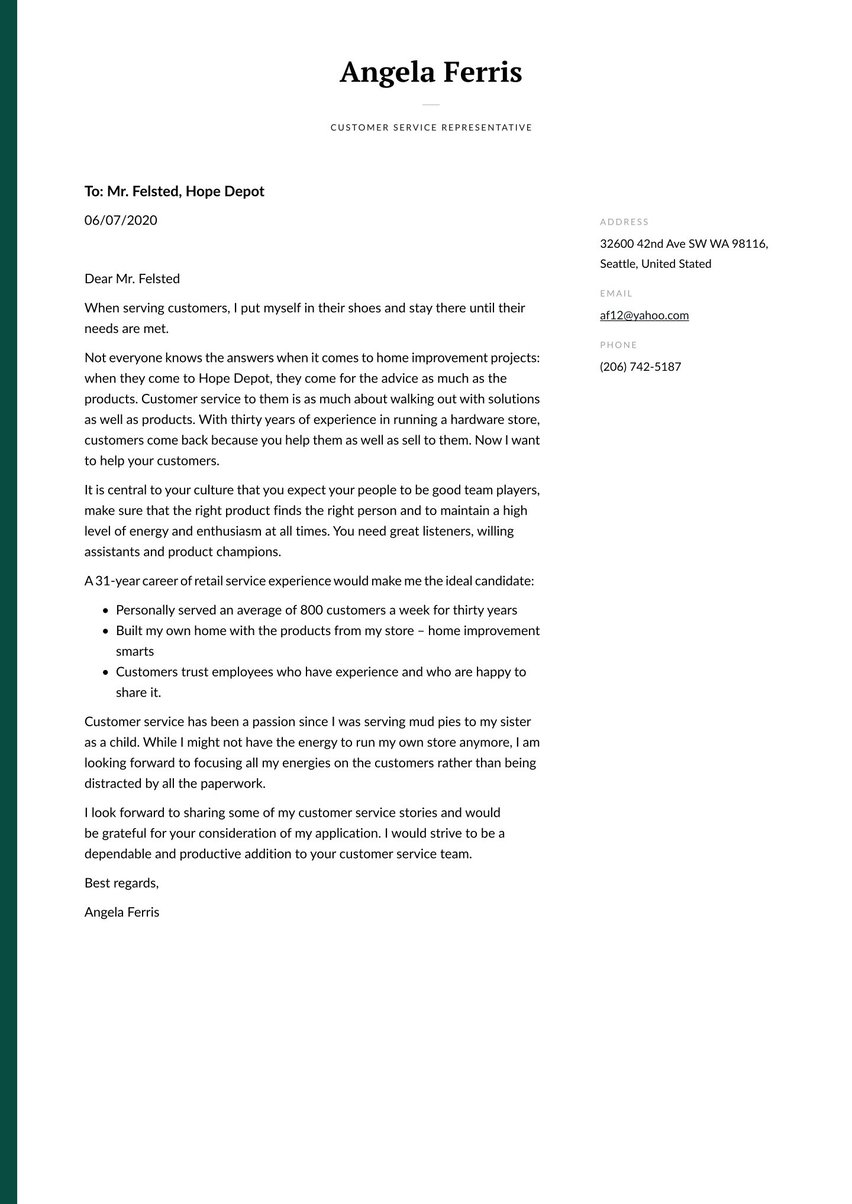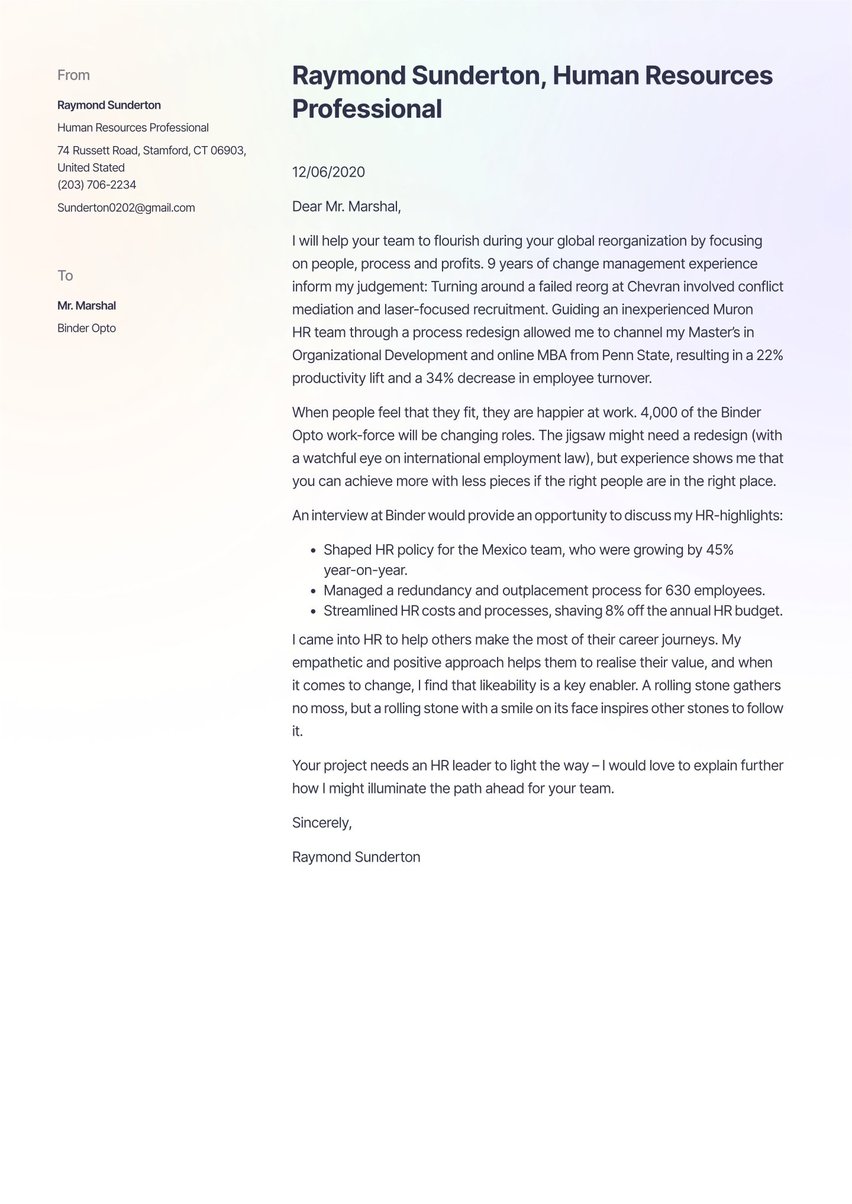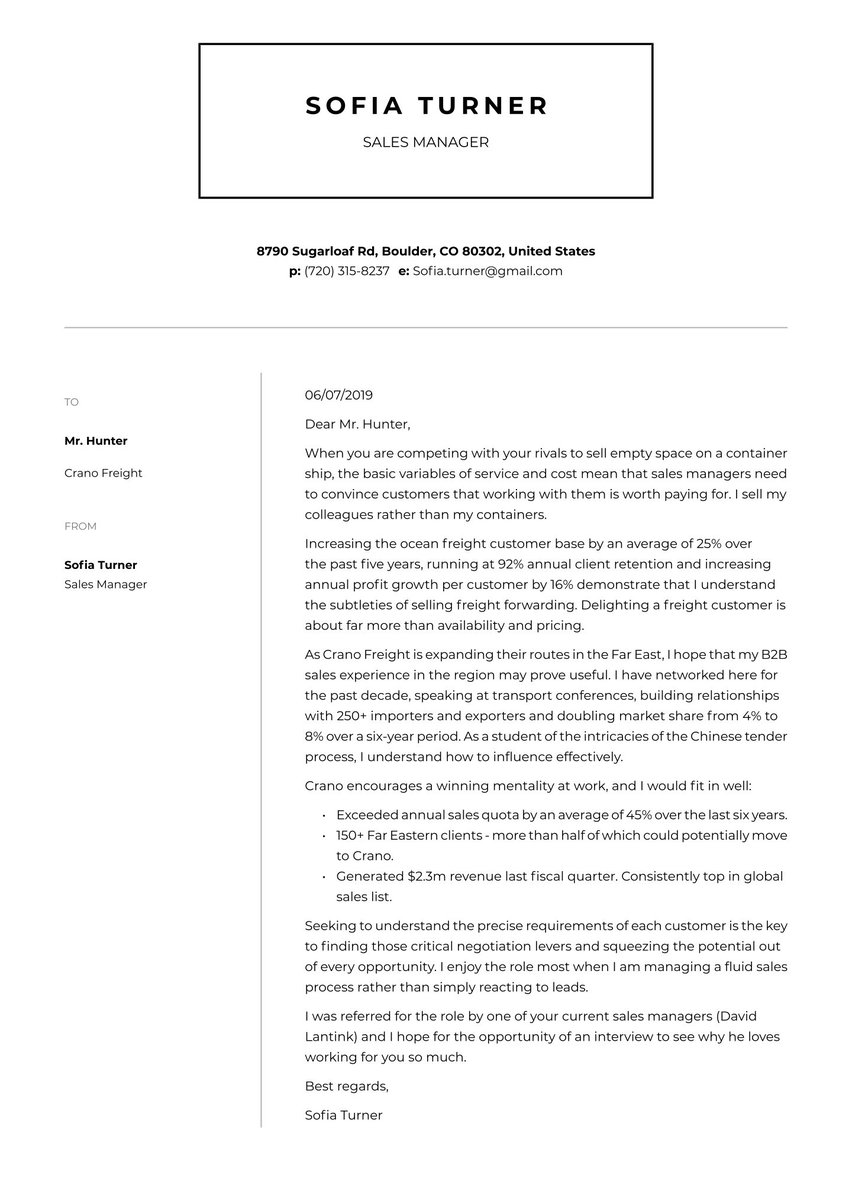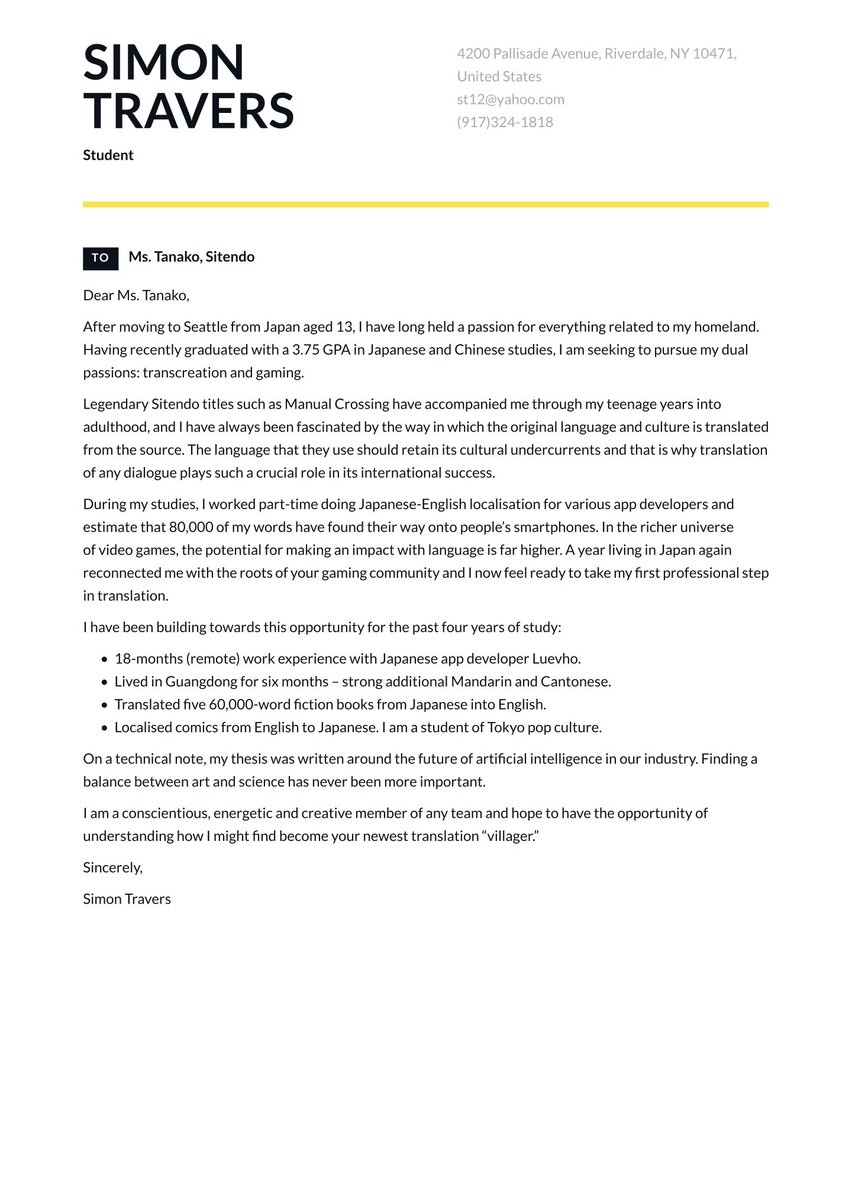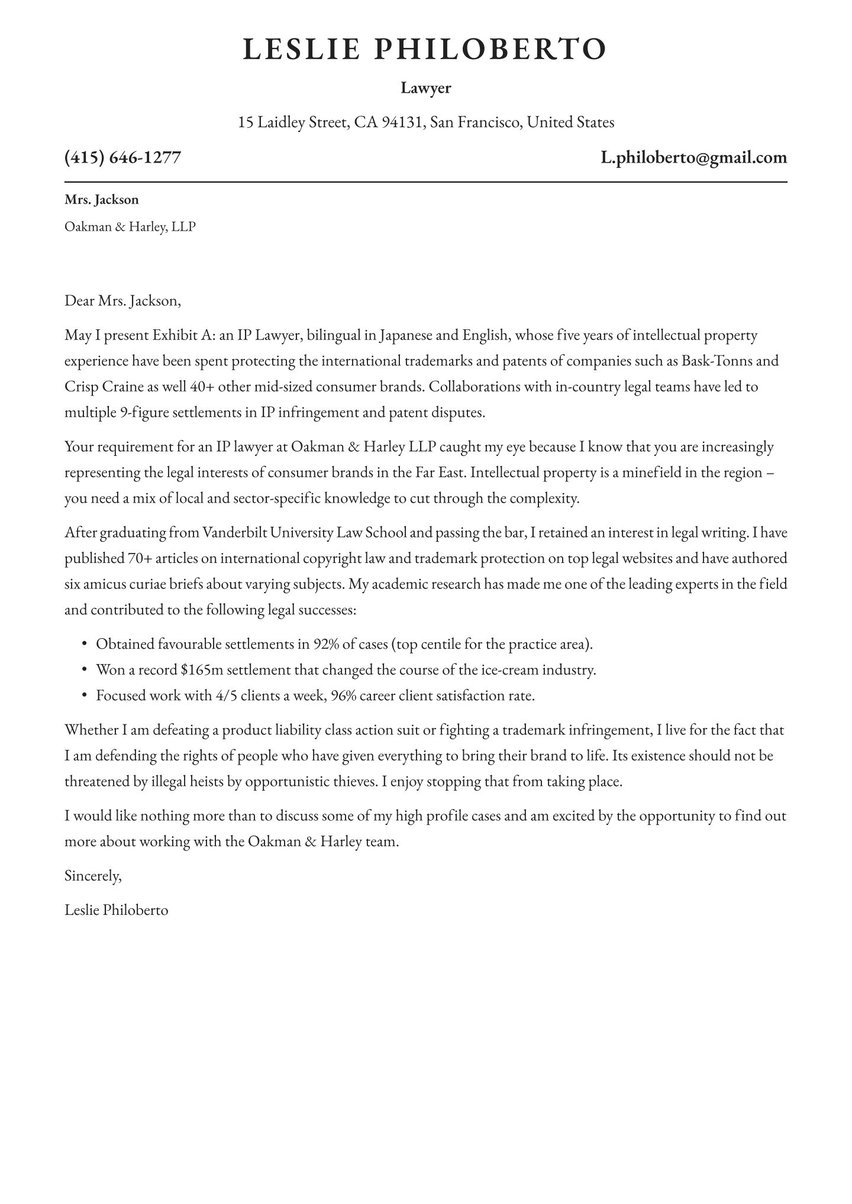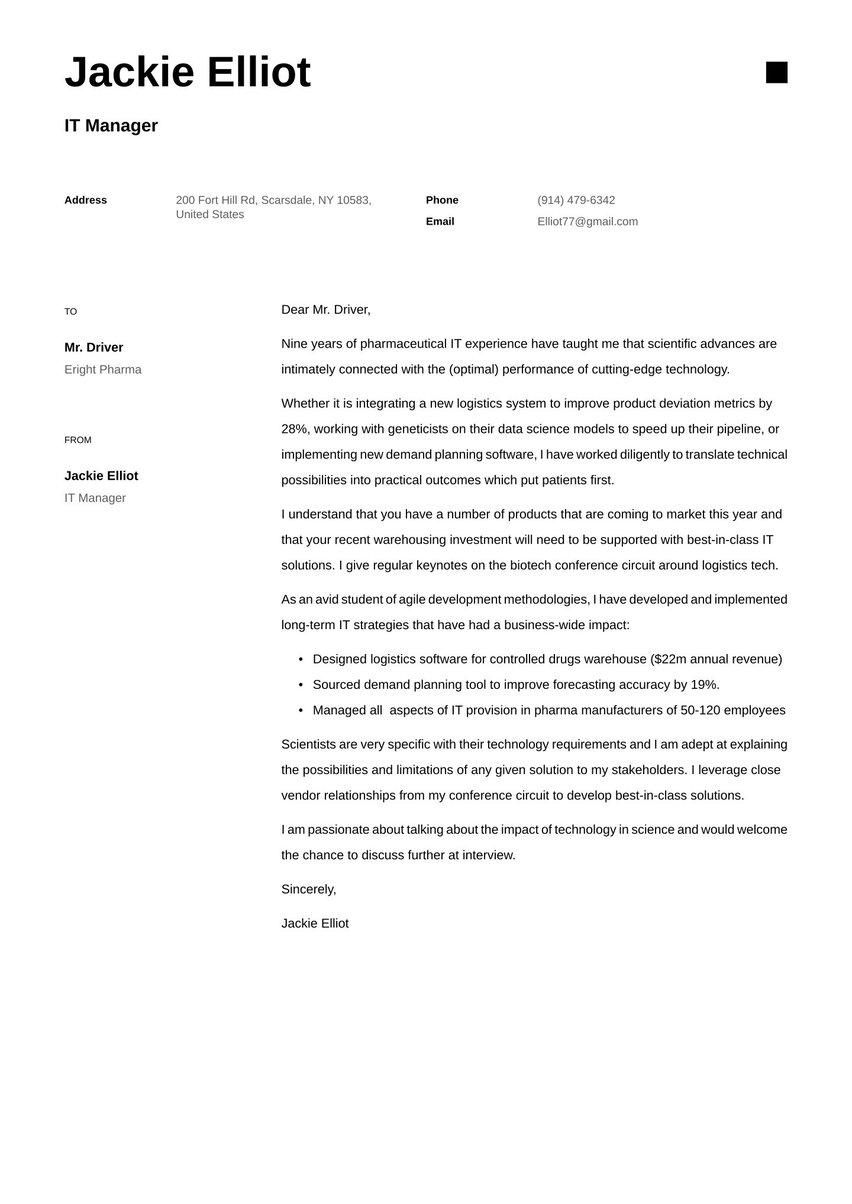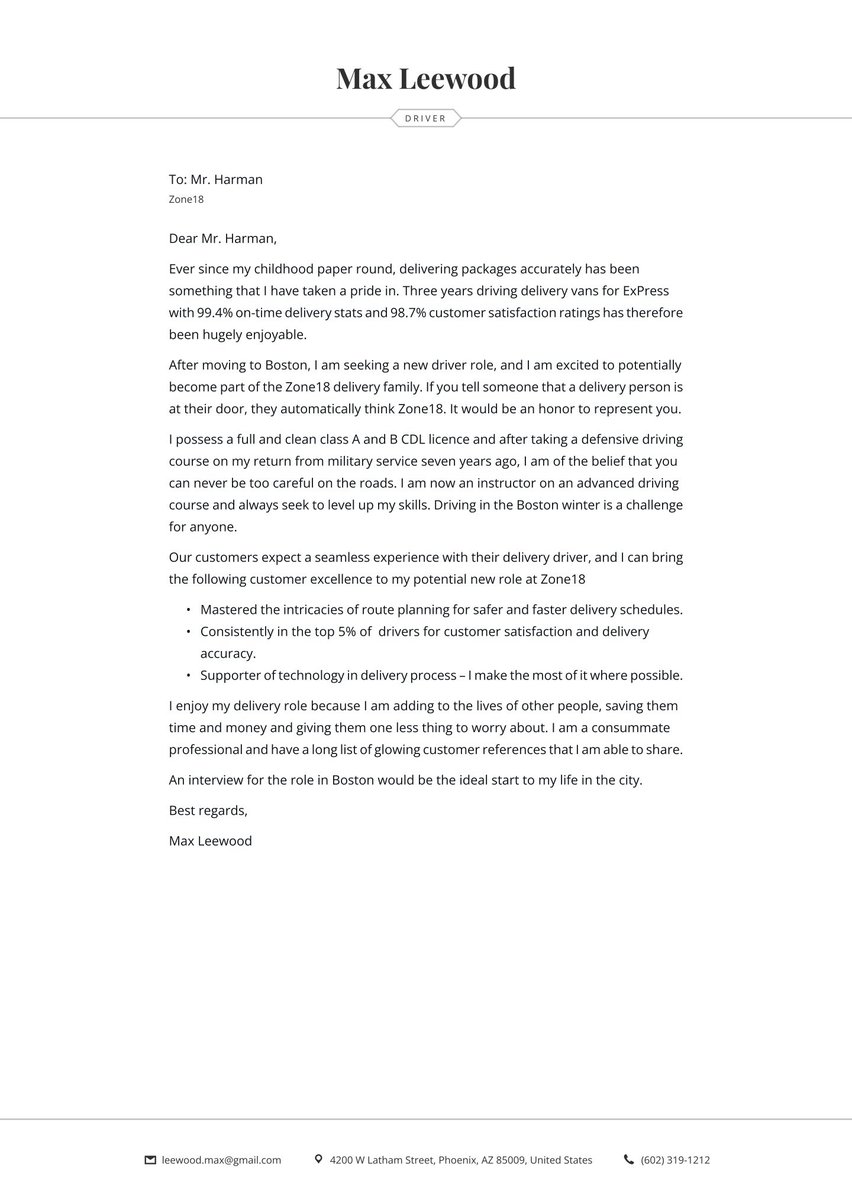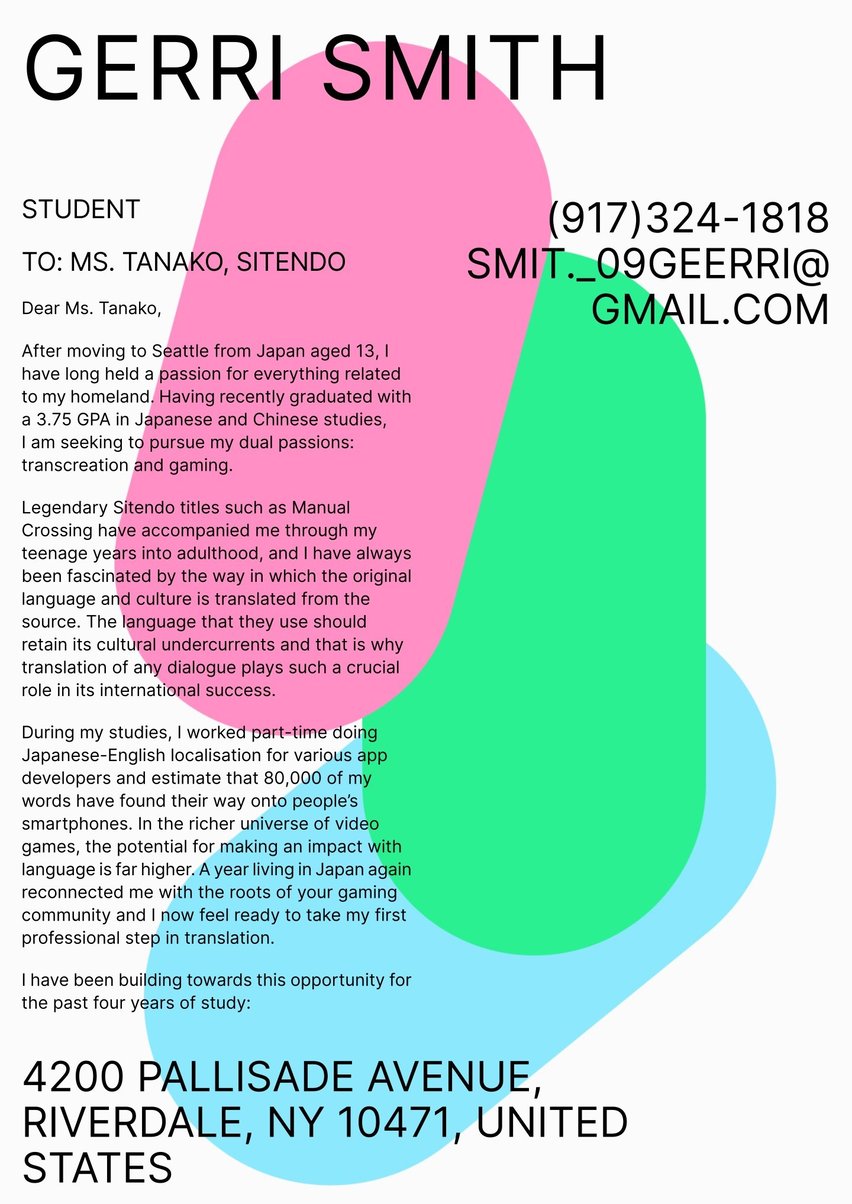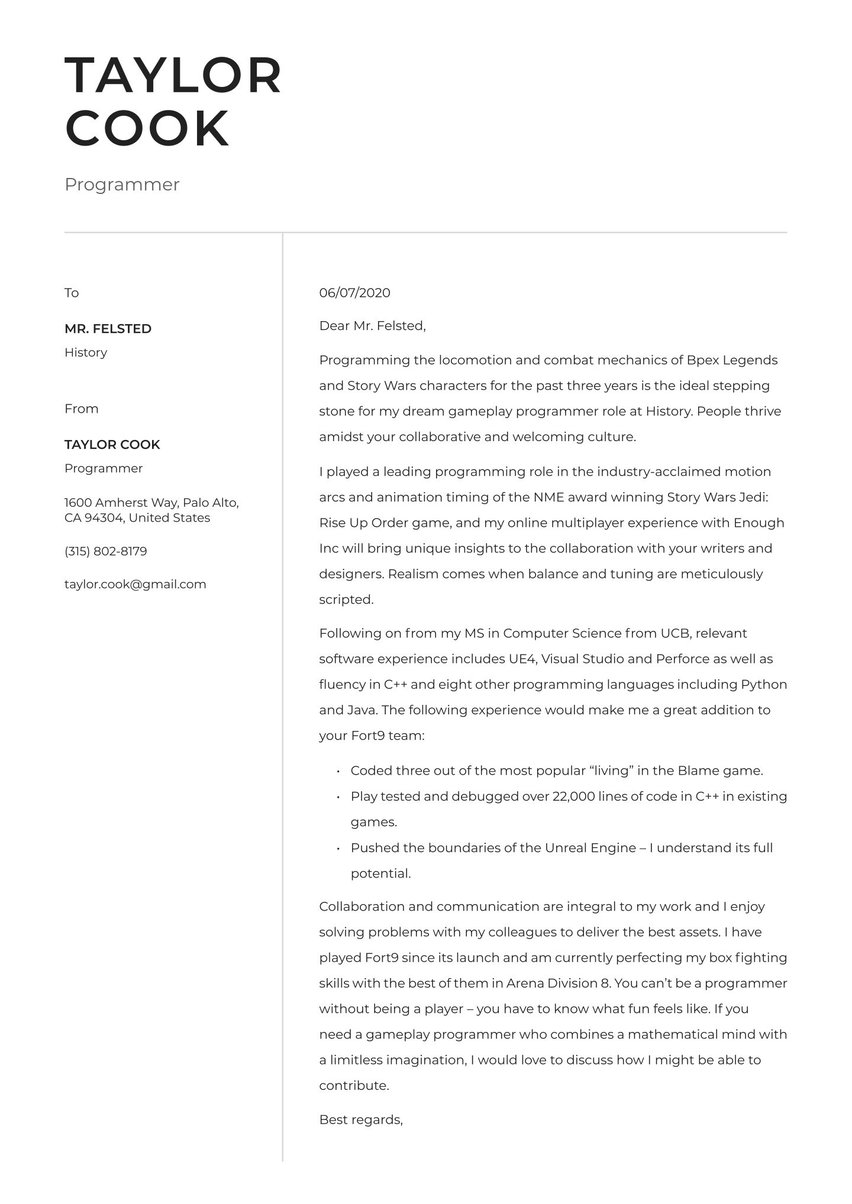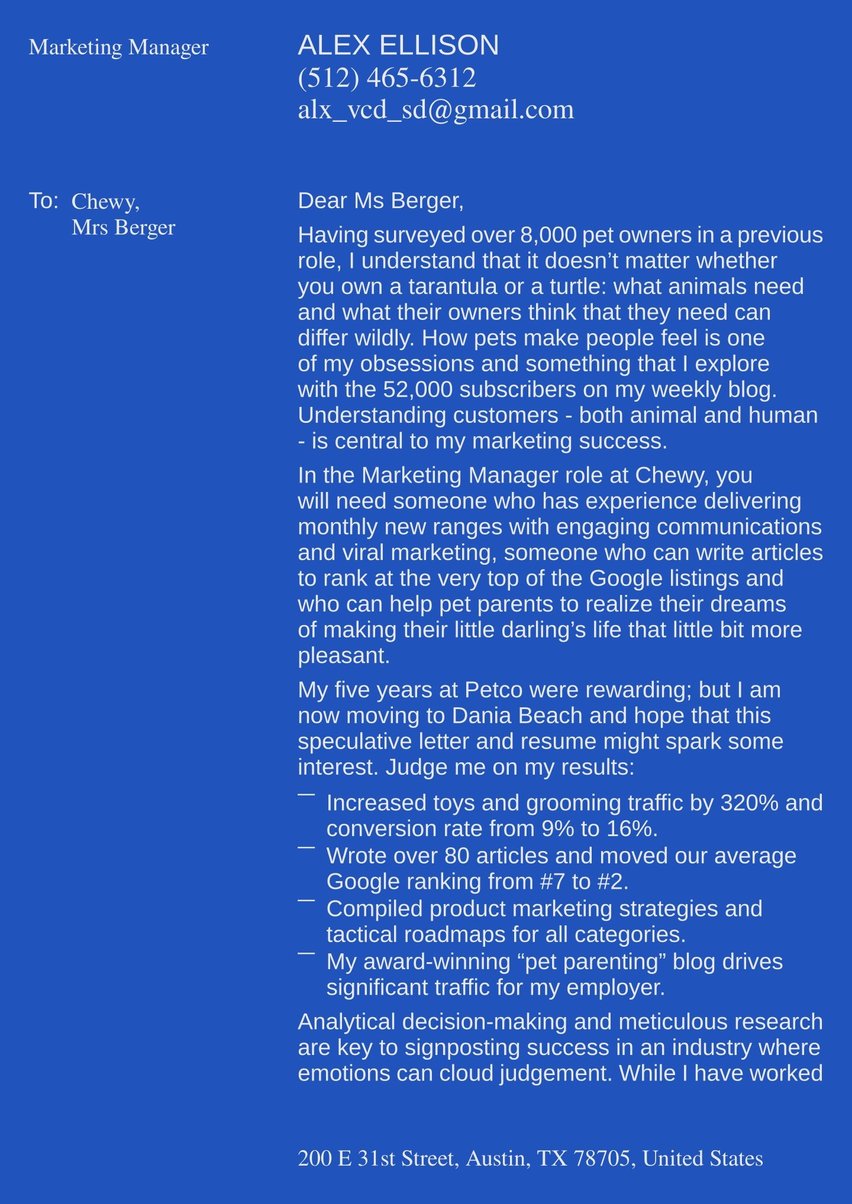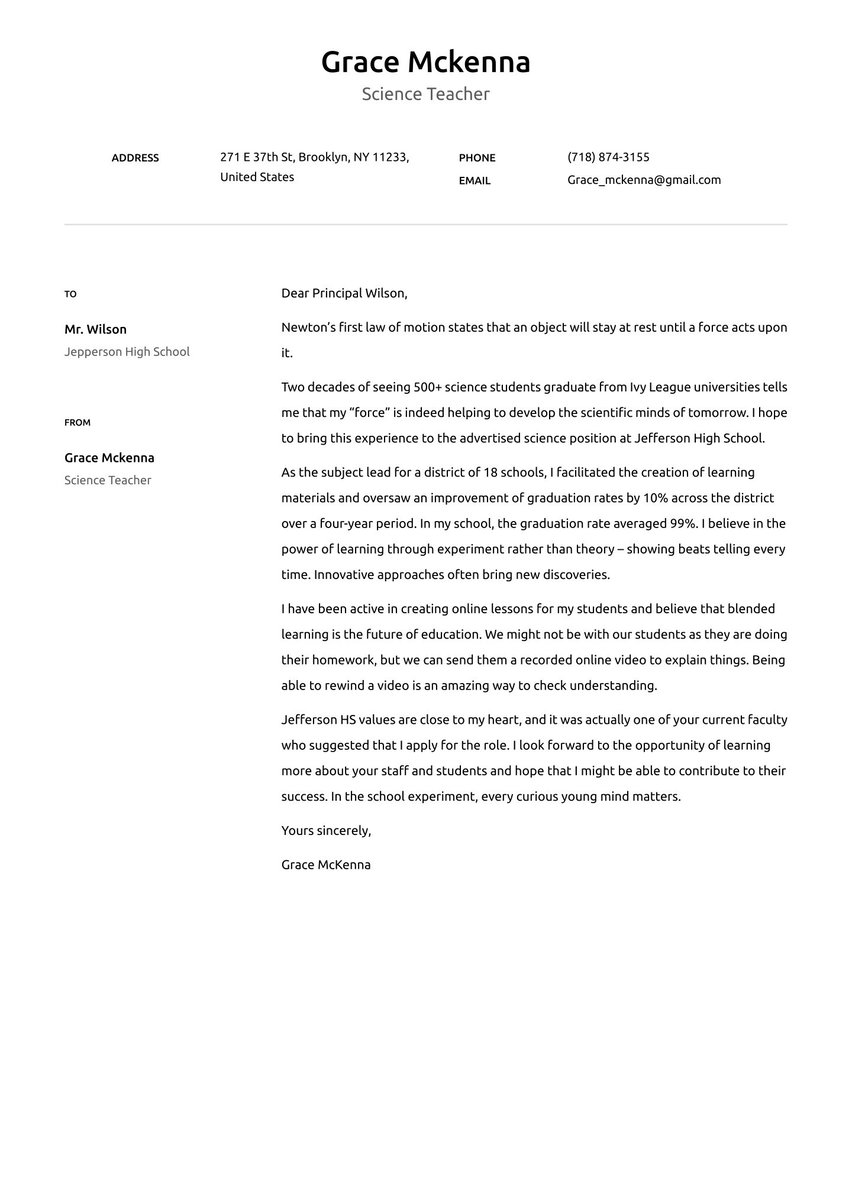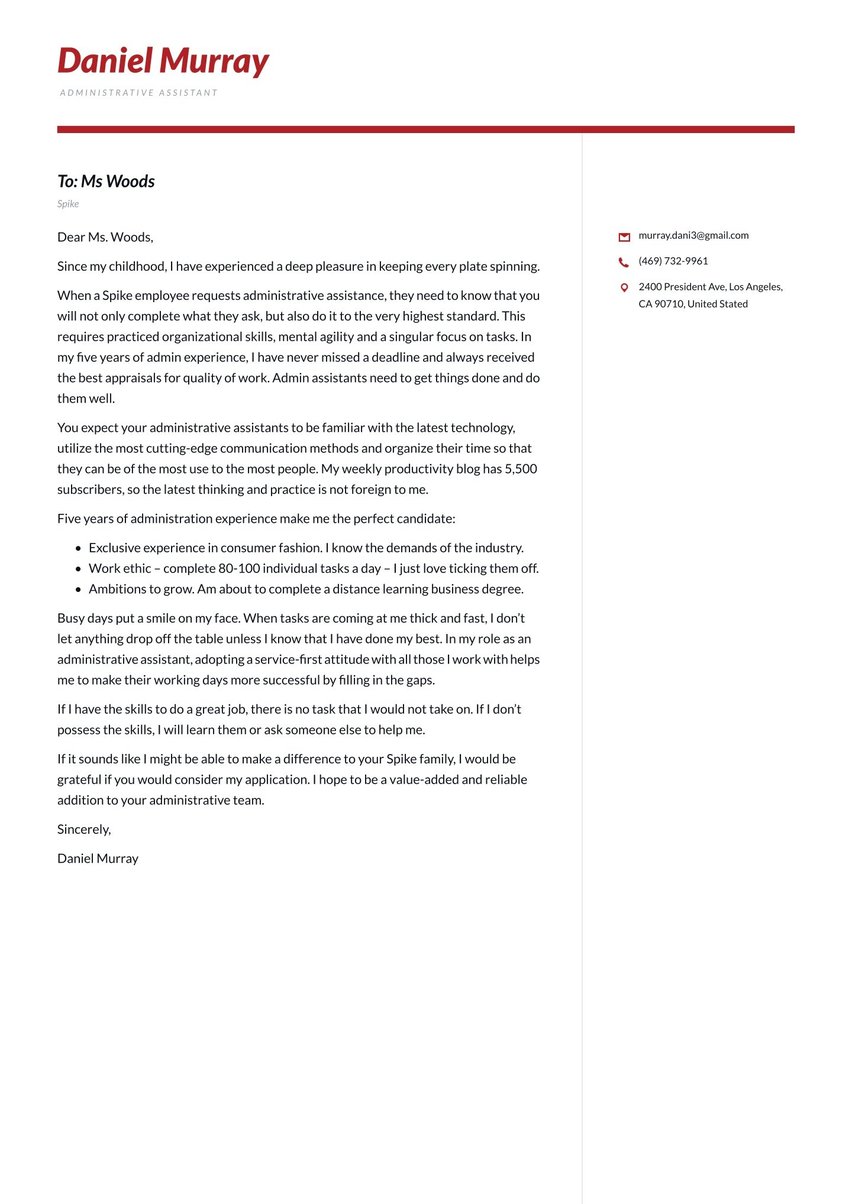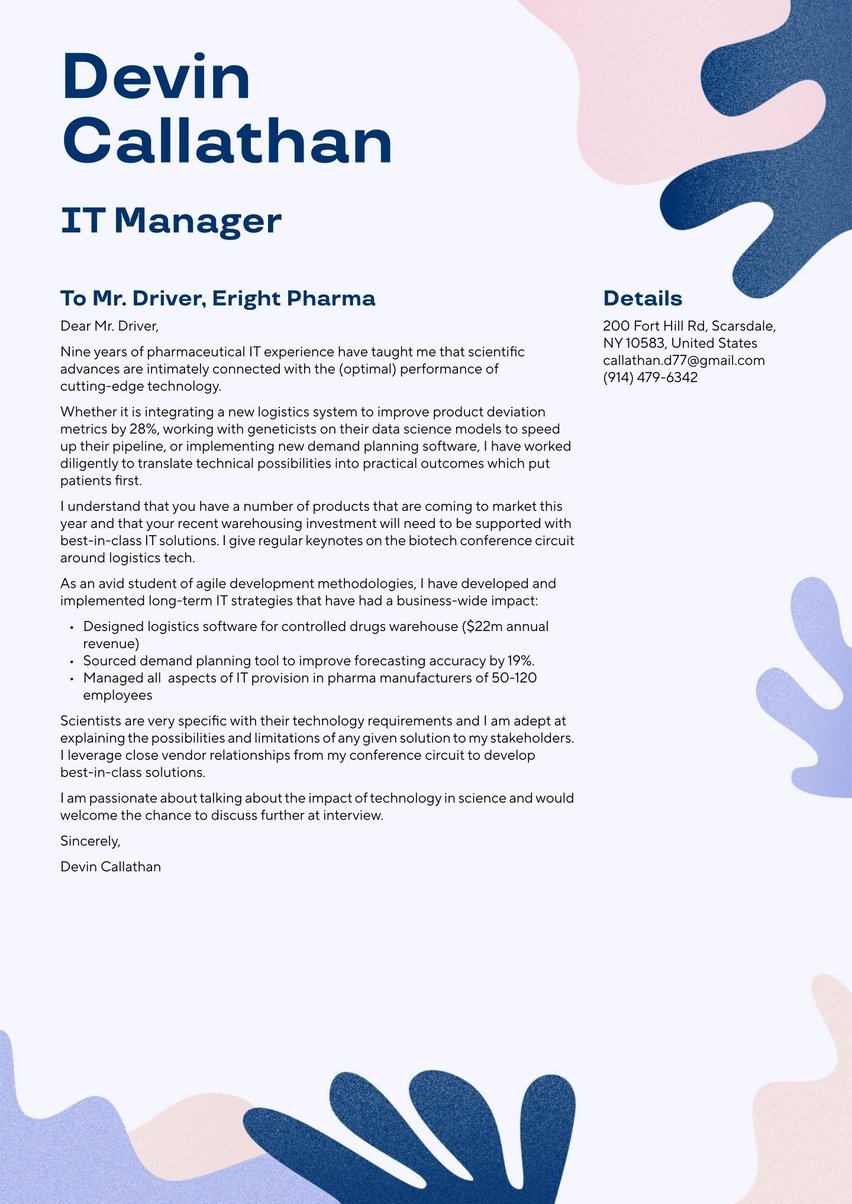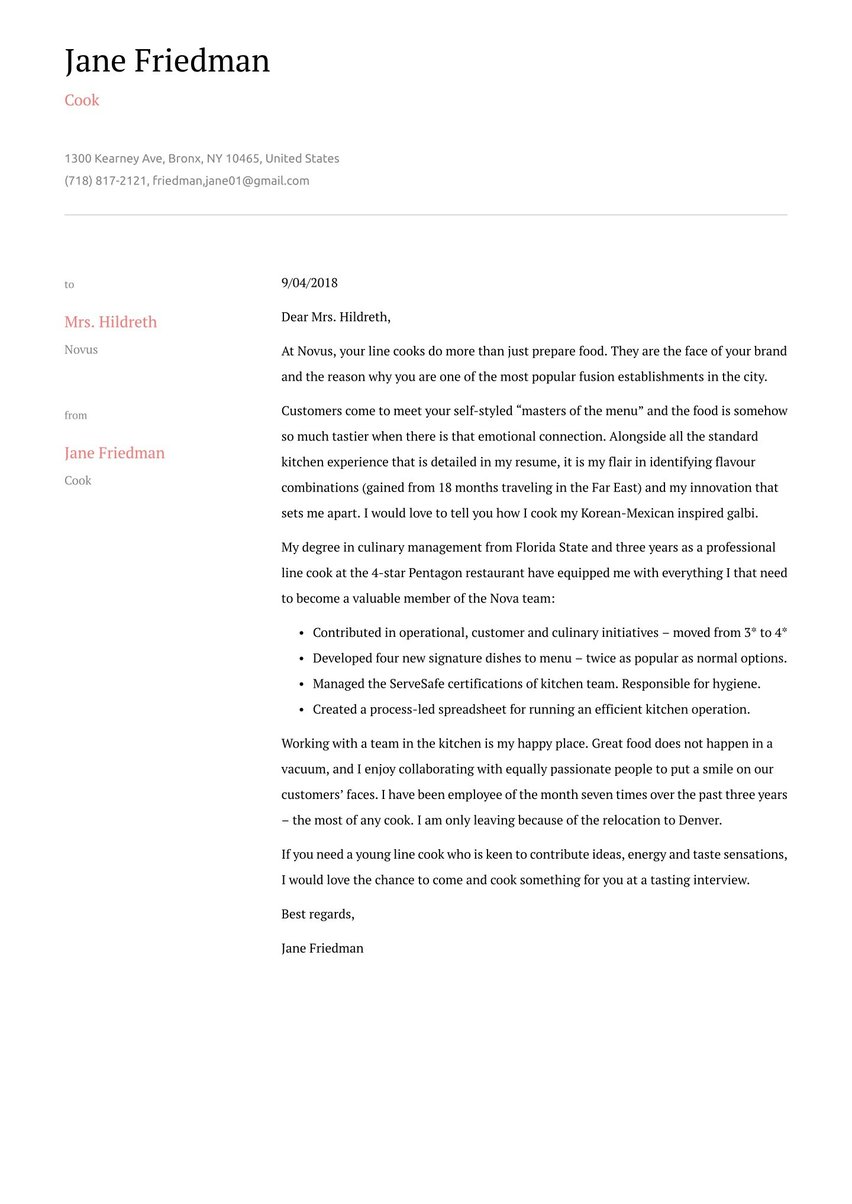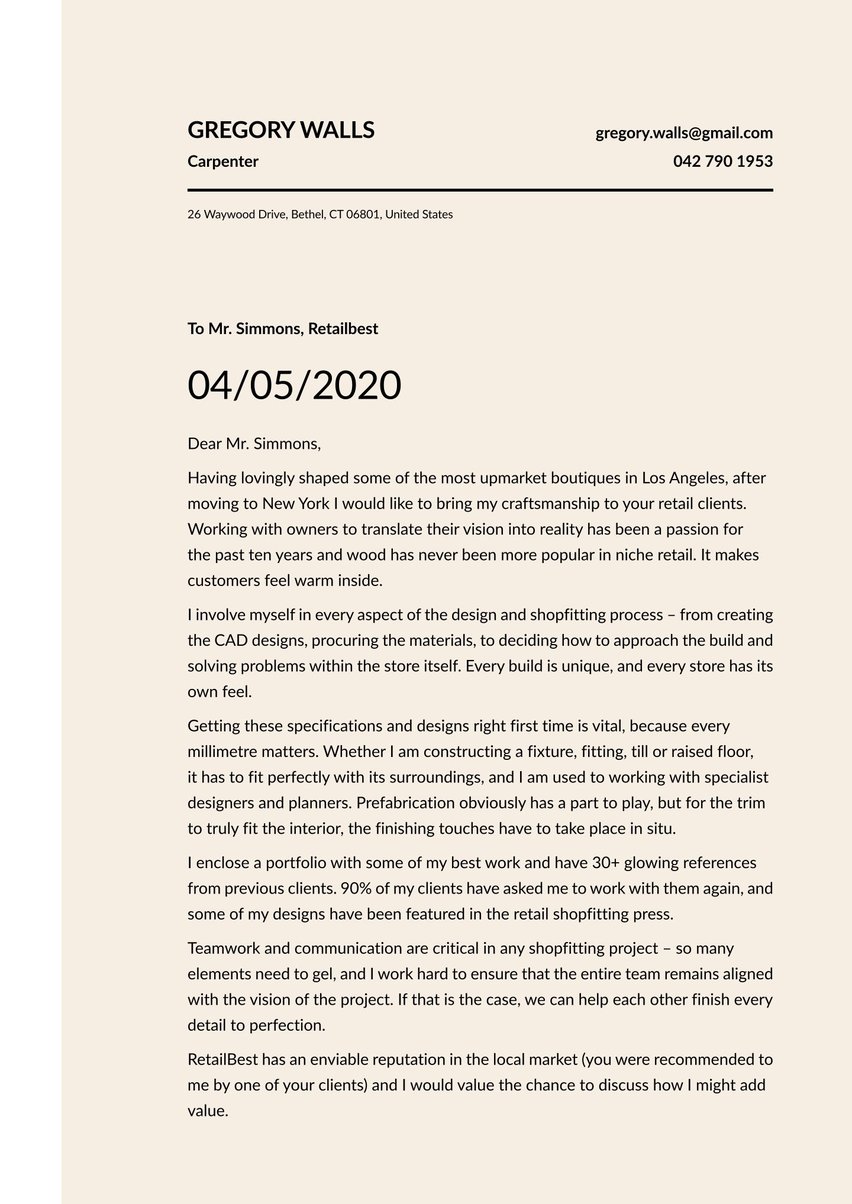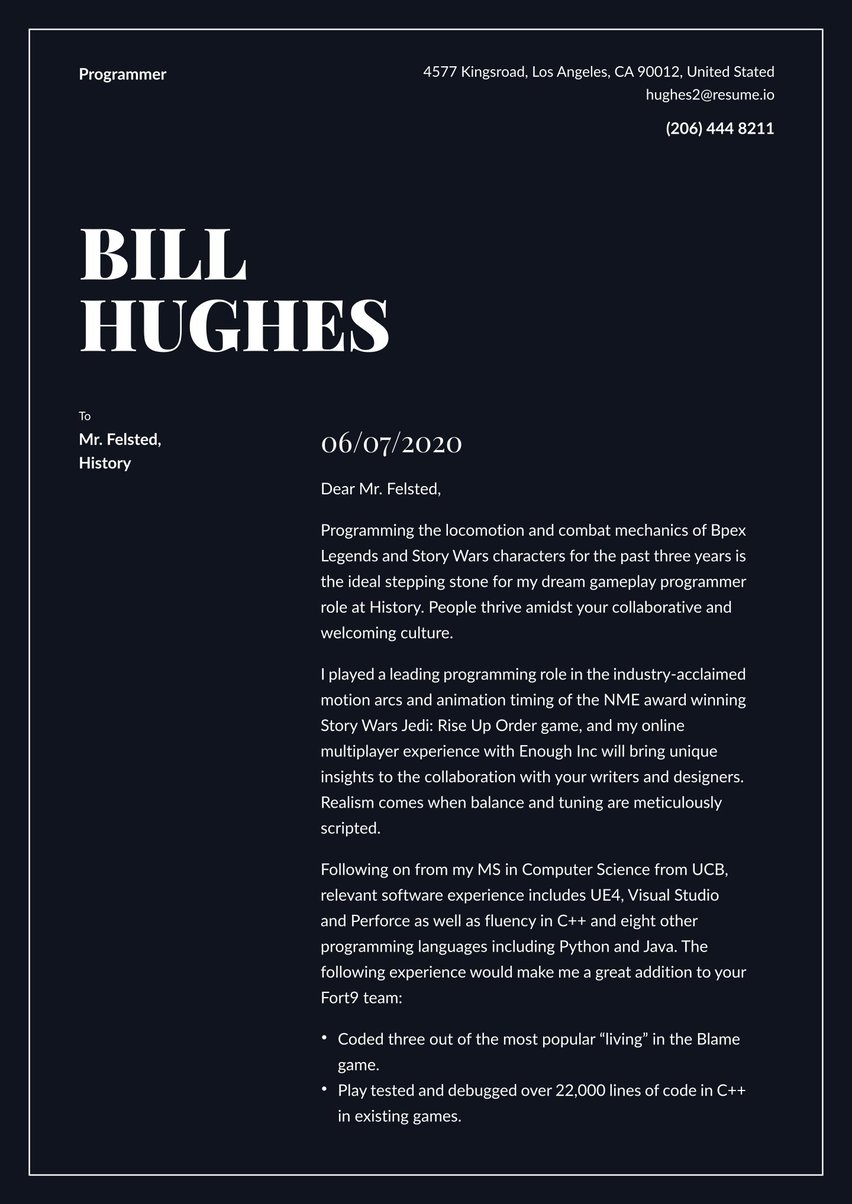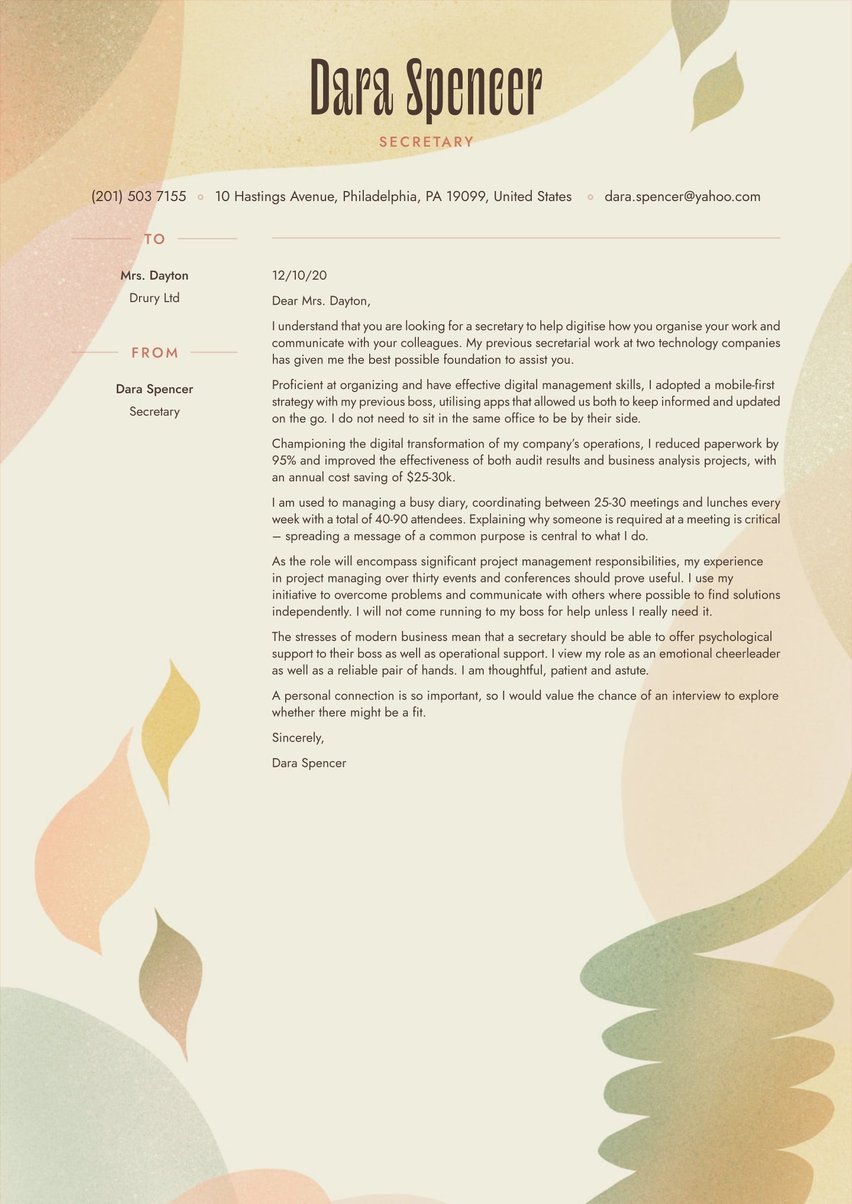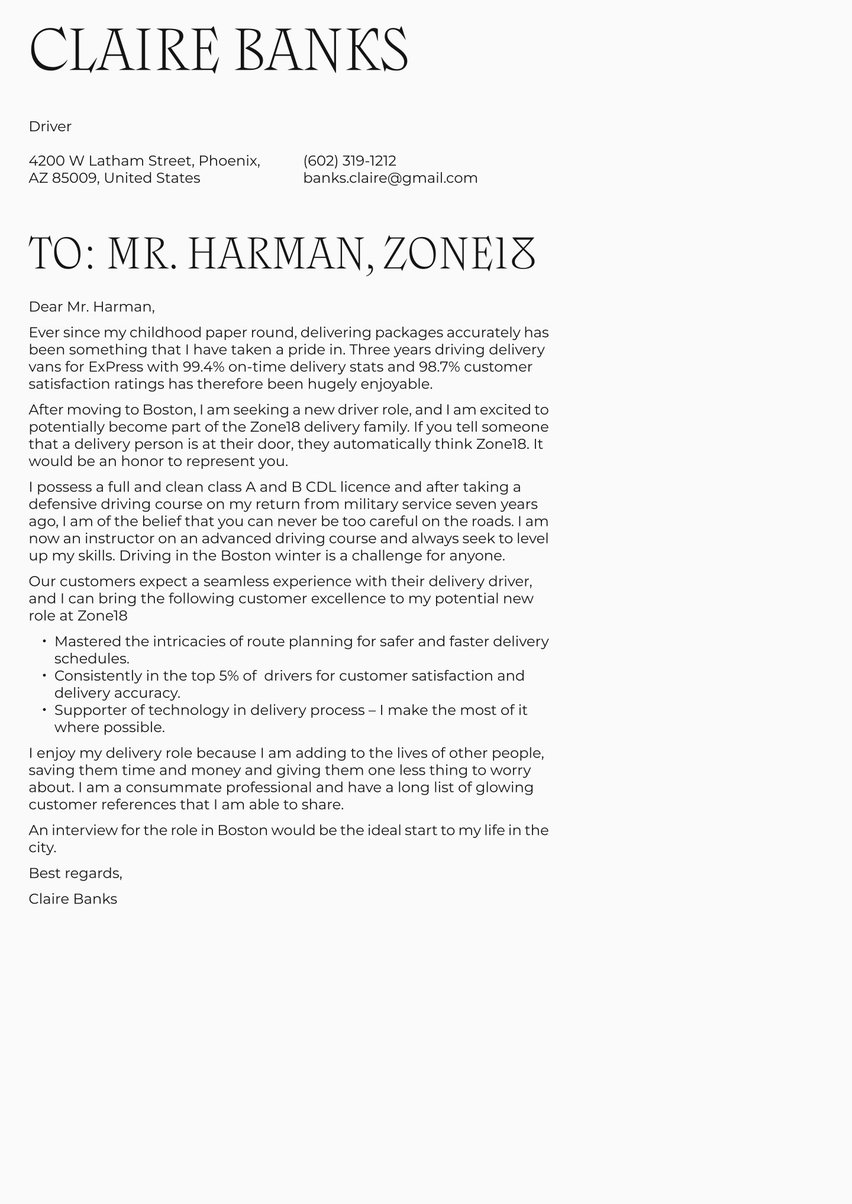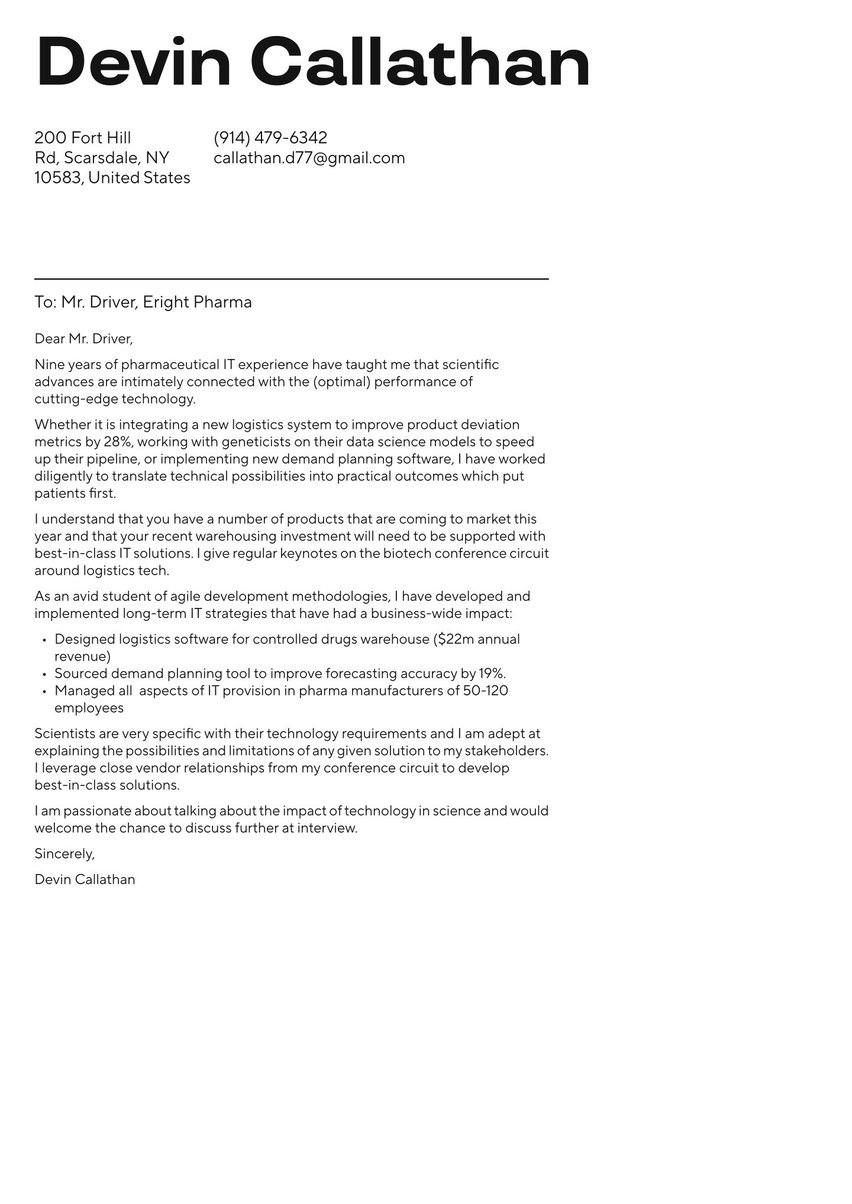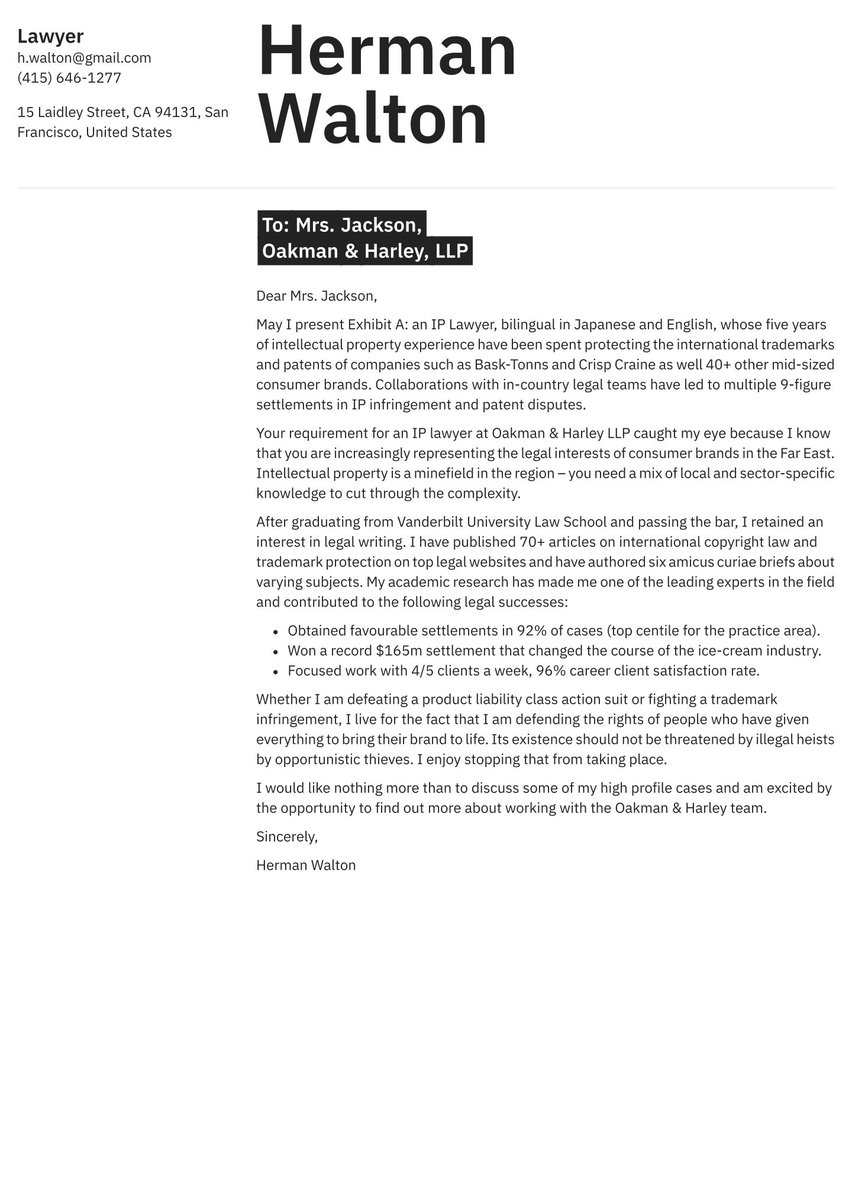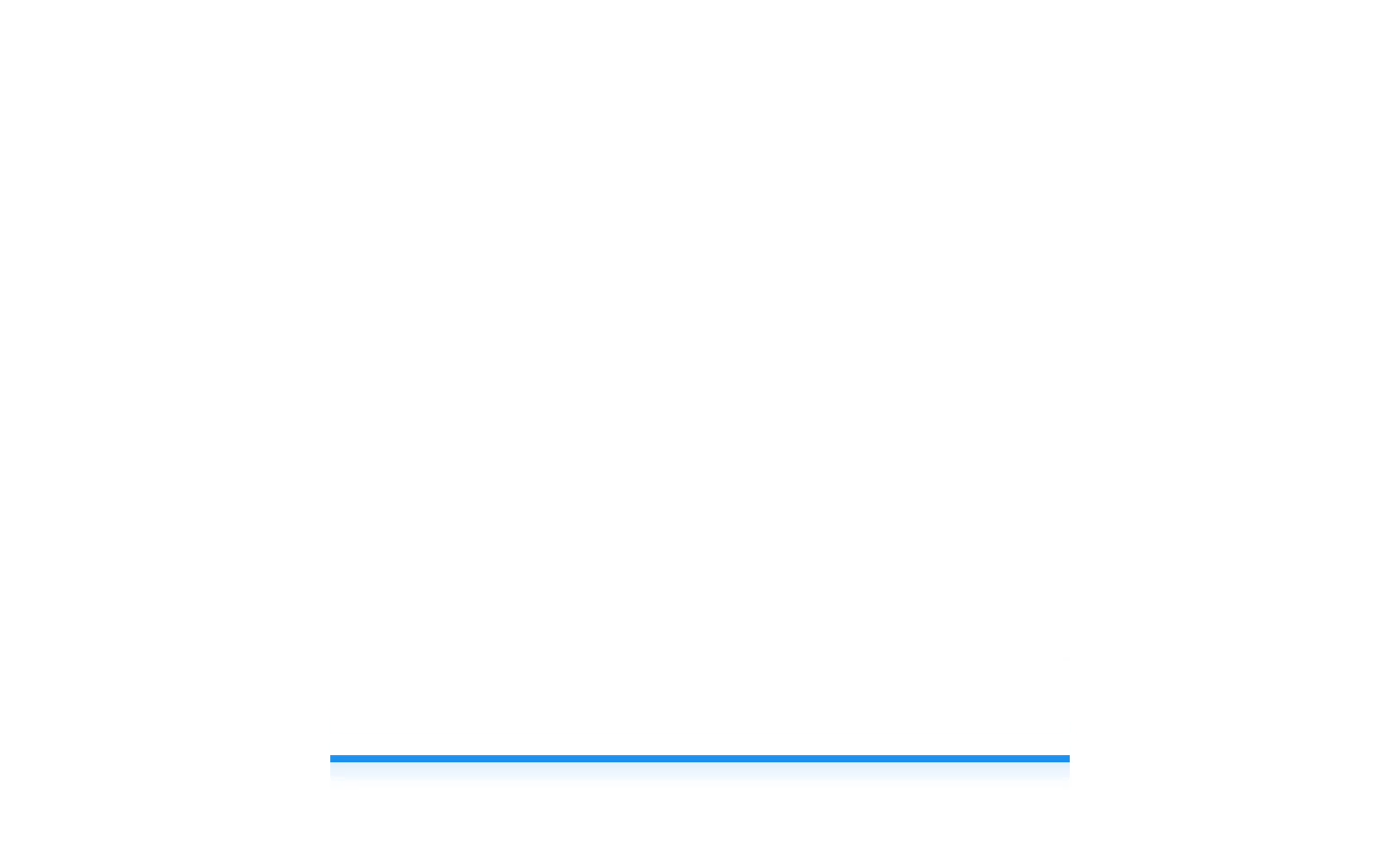Chances are, if you’re applying to be a flight attendant, you already know the reality – it’s a highly competitive job market. So how do you stand out and make it to that coveted interview round? You’re going to need an exceptional flight attendant cover letter.
Your cover letter is the perfect place to convince the hiring airline that you’re responsible, personable and ready to learn. And resume.io is the perfect place for help with this vital job application document. Our job-winning resources include a wide selection of occupation-specific writing guides and corresponding cover letter examples.
This guide, along with an effective cover letter examples geared specifically to flight attendants, will:
- Explain the importance of a tailoring your cover letter to maximize your chances of landing the job
- Break down the cover letter structure into step-by-step parts and show you how to optimize the impact of each one: header, greeting, introduction, body and closing/sign-off
- Explore the principle of specificity to make your letter stand out from the crowd
- Examine some of the most sought-after qualities for potential flight attendants
- Review common cover letter mistakes
Now it’s time to get started on your professional cover letter.
Why you need a flight attendant cover letter
A cover letter, also called an application letter, is your chance to make a great first impression with a potential employer before you ever set foot in the door for an interview. This document isn’t as structured as your resume so it allows you to expand on your strengths or answer any questions that may naturally arise like gaps in work history or career changes.
Tailoring your cover letter
Every flight attendant position is not the same. As a new applicant, you may have no way of knowing whether you’ll be put on international flights or domestic flights or to which destinations you’ll fly, but you can research the company to get a feel for their image as a whole.
You should use this information to show not only why you’d make a great flight attendant, but why you’re the perfect crew member for their team. Some companies are geared toward business travellers while others take care of vacation routes. Maybe the company is the flagship of a country, state or city. Incorporating this type of information into your cover letter helps you appear polished and focused. For an even more detailed look, make sure to check out our flight attendant cover letter sample below.
Since new flight attendants don’t have any experience in the industry, a cover letter is particularly important to show why you have the right personality and innate skills to ace training and succeed in the sky.
If you have years of experience, your cover letter is a chance to dive into some of your most challenging moments where your knowledge and skill helped you manage the situation effectively.
In search of more useful writing tips? Check out our related transportation cover letters
Maximizing your chances
Who doesn’t want to get paid to jet set to a new exotic destination every week? Of course, it’s not always vacation mode. Flight attendants work long hours dealing with fussy passengers and paying close attention to the safety and comfort of everyone on board.
Airlines are looking for any opportunity to weed out applications that don’t show an understanding of the real challenges flight attendants face. So how do you stand out and make it to that coveted interview round? You’re going to need an exceptional flight attendant cover letter.
It may be a tough job to land, but as long as there are planes in the sky, airlines will need flight attendants. Somebody is going to get that job, so why shouldn’t it be you?
Given the large number of applicants applying for each flight attendant position, getting selected can feel like sheer luck. It isn’t. You can never guarantee you’ll get the job, but there are things you can do to greatly increase your chances. Writing an exceptional cover letter is one of them. Unless the job posting specifically asks you not to write a cover letter, you should always include one. On your resume, this type of personal information is limited to just a few lines in the profile summary. You can’t do much to change your work history (nor should you) but your cover letter is a blank canvas that allows you to share your story full of your successes and greatest achievements.
Around the world, the demand for flight attendants will grow as air traffic is expected to increase by 4% each year over the coming decade. In North America alone, that amounts to a need for 170,000 new flight attendants, according to Statista.
Imagine for a moment that for this position you are up against four other candidates. Your background is in hotel management, the other is a nature photographer, one is a former nurse and the last is a high school French teacher.
Who’s getting the job?
Impossible to say! And that’s because until you become a flight attendant, you can’t possibly have experience in this exact field. Your resume may have some crossover skills, but the majority of it will be largely irrelevant. That’s why you shouldn’t fear the cover letter writing process. Instead, view it as a chance to make your own opportunity.
Best format for a flight attendant cover letter
Although you’ll need to update your cover letter for each position that you apply to, the good news is that the structure won’t change much. Breaking it into sections makes it much easier to tackle the writing process by allowing you to check off one thing at a time. Here are the key components:
- The cover letter header
- The greeting
- The introduction
- The letter body
- The conclusion
- The signature.
Let’s get started:
Dear Mrs. Buckbridge,
Having clocked up over 2,000 hours in both long and short-haul flights and acquired five years of experience as a flight attendant, I’ve learned that a variety of passengers bring with them a variety of challenges. I take pride in excelling in every aspect of customer service.
In my five years at Wings, I was involved in change initiatives across pre-flight, in-flight and post-flight customer service. From the moment passengers walk up to the check-in desk to the moment they leave the airport, they associate their experience with your airline. Ensuring their well-being, safety and comfort at every stage is our job. I received 96% positive recognition from passenger surveys and consistently high ratings from my team.
I hold all of the relevant certifications, including the FAA Certificate of Demonstrated Proficiency. I am an advanced first aid provider and I actually helped lead the Wing's training on emergency response. I have coordinated the in-flight and air-to-ground responses to terrorist threats, abusive passengers and (more happily) multiple childbirths. I have passed my experience on to over 165 flight attendants and value my role as a leader in the cabin crew.
My contributions made a broader impact on Wings, in ways I hope to replicate in future:
- Designed a more efficient boarding protocol — speeding up procedures by 14%.
- Improved customer satisfaction metrics by 10% points on long-haul flights.
- Updated the cabin crew first-aid manual after noticing deficiencies in advice.
Putting passenger needs first is at the heart of everything that I do. The most-common adjectives that passengers use to describe me in their feedback are: warm-hearted, soothing and attentive. Being professional in the air does not preclude being caring.
I would love to hear more about the US Airlines culture at a potential interview.
Sincerely,
Angela Ferris
Cover letter header
Airlines are typically large organizations that require a team of HR professionals to handle hiring decisions. That means your cover letter may be reviewed by multiple people. The primary purpose of your header is to make sure your document is properly labeled so that no one is left wondering who it belongs to and how to get in touch. For online applications, it’s best to stick to just the necessary information, usually your name and contact info will suffice. Anything more than that takes away from precious space to convince them of your qualifications. The goal of this section: Identify the document and keep your contact information at a recruiter’s fingertips, create an aesthetically-pleasing visual presentation
Align document styles!
The second goal of your header is to provide clean and attractive formatting for your letter. This may be your only opportunity to add color or other flourishes to an otherwise straightforward document. Make sure to choose these creative elements wisely, paying close attention to visual identity of the company you are applying to.
To present an even more polished image, try aligning the document styles across your resume, cover letter and other application materials. This will help you create a “personal brand” – a look and feel which resonates throughout your application. If you don’t have graphic design experience, professional formatting tools can make this easy to accomplish.
Cover letter greeting
The cover letter greeting is your first opportunity to set the tone for the rest of the cover letter. A standard “Dear Mr. <Surname>" or "Dear Ms. <Surname>" will do the trick.
Conventional wisdom says your greeting should use the name of the hiring manager to create a personal connection right from the start. If you happen to have that name, definitely include it.
However, since airlines are such large companies, it’s more likely you won’t know who exactly to address. In that case, a collective noun like “Dear Flight Attendant Hiring Team” can work well. You might even try “Dear <Company Name> Family” for airlines with heartfelt branding.
The goal of the cover letter greeting: Create a respectful and polite tone right from the start, address the recipient with a name if you have it, or the appropriate collective noun.
Dear Mrs. Buckbridge,
Cover letter introduction
Imagine a tired hiring manager sorting through hundreds of hopeful flight attendants’ cover letters. Then they come across yours, and the first sentence is full of energy and life. A great introduction is powerful. Not only does it encourage a hiring manager to keep reading, it can get them truly excited about you as a candidate.
An interesting anecdote, bold statement or exciting presentation of yourself can all be effective ways to start. You should avoid the snooze-inducing “I am writing to express interest in your vacancy for a flight attendant” at all costs. But you should also be weary of clichés (more on that in a second).
The goal of the cover letter introduction: Create an attention-grabbing opening that hooks the attention of hiring managers and makes them want to keep reading.
Having clocked up over 2,000 hours in both long and short-haul flights and acquired five years of experience as a flight attendant, I’ve learned that a variety of passengers bring with them a variety of challenges. I take pride in excelling in every aspect of customer service.
Cover letter body
The middle section of your cover letter is where you can really dive into all the unique qualifications that make you great for the role of a flight attendant.
If you’ve been a flight attendant before, you can use the "STAR" method to discuss previous challenges and how you handled them effectively. First, explain the situation and the task, then outline the action you took and the positive result.
Just be sure to keep your anecdote concise to make sure the letter flows well. If this is your first shot at a flight attendant position, you can still use the STAR method to talk about your successes in other roles. This works especially well for showing off your customer service skills, which are highly sought after by airline hiring managers.
The goal of the cover letter body: Present your previous achievements in a way that relates to this new position or profession, expand on the skills and personality traits that make you a great fit for this role.
In my five years at Wings, I was involved in change initiatives across pre-flight, in-flight and post-flight customer service. From the moment passengers walk up to the check-in desk to the moment they leave the airport, they associate their experience with your airline. Ensuring their well-being, safety and comfort at every stage is our job. I received 96% positive recognition from passenger surveys and consistently high ratings from my team.
I hold all of the relevant certifications, including the FAA Certificate of Demonstrated Proficiency. I am an advanced first aid provider and I actually helped lead the Wing's training on emergency response. I have coordinated the in-flight and air-to-ground responses to terrorist threats, abusive passengers and (more happily) multiple childbirths. I have passed my experience on to over 165 flight attendants and value my role as a leader in the cabin crew.
My contributions made a broader impact on Wings, in ways I hope to replicate in future:
- Designed a more efficient boarding protocol — speeding up procedures by 14%.
- Improved customer satisfaction metrics by 10% points on long-haul flights.
- Updated the cabin crew first-aid manual after noticing deficiencies in advice.
Putting passenger needs first is at the heart of everything that I do. The most-common adjectives that passengers use to describe me in their feedback are: warm-hearted, soothing and attentive. Being professional in the air does not preclude being caring.
Creating a unique application
In an industry as competitive as this, you’ll need to create a cover letter that truly shines. One way to give yourself an advantage is by avoiding cliches and stereotypes about the flight attendant job and its duties.
While a love of travel and adventure is important, a flight attendant needs to have the capacity to endure sleepless nights and difficult customers. They need to be able to speak multiple languages and feel just as capable of managing stressful situations as they do cleaning the seats at the end of a long flight.
If you can give concrete evidence of the way you handle tough problems and provide excellent customer service, you’re likely to fare better than other applicants who “enjoy meeting new people” but fail to convey an understanding of the challenges flight attendants face.
Cover letter conclusion and signature
After you’ve laid out all the evidence for why you’d make a great flight attendant, it’s time to create your call to action. This sentence or two expresses your interest in learning more about the position and invites a hiring manager to get in touch.
Then, close the letter in a respectful way. “Sincerely,” “Best” or “Best Regards” can all work well.
The goal of the cover letter conclusion: Create an effective call to action that expresses your passion for the position without being rude or presumptive.
I would love to hear more about the US Airlines culture at a potential interview.
Sincerely,
Angela Ferris
Writing psychology — cover letter tools and strategies
As a future flight attendant, there are some key qualities that will show you have an understanding of the demands of the job.
- Stamina: Even short flights can require a lot of physical toughness and mental concentration. Any experience you have that shows your ability to perform well, even in emergency situations, can be great evidence of your aptitude for the position.
- Politeness: About half of flight attendants’ duties involve conflict resolution and customer satisfaction. Can you meet customer care standards even with a passenger who is rude or uncooperative?
- Focus: The other half of flight attendants’ duties are safety-related. This means paying attention to details, knowing when something is wrong and using your problem-solving abilities, even under immense pressure.
- Foreign languages: Along with first aid and medical experience, foreign languages are some of the most important skills for new flight attendants. Examples of the way you used foreign language in customer service positions can make great additions to your cover letter.
The power of specificity
We’ve already noted that an anecdote about providing great customer service under pressure is much more effective than sweeping statements on your love of travel. But why?
According to researchers and writers Dan and Chip Heath, specificity is one of the most important qualities when it comes to creating ideas that persuade or influence us. A cover letter is all about persuasion, which in turn is all about evidence.
When you make a statement like “I am great with people,” you are telling the hiring manager what you can do, in the hope that they’ll believe you. In contrast, an anecdote which specifically lays out a problem you faced and an action you took is a way of showing a hiring manager what you’re capable of. You’re not asking them for blind trust. Instead, you’ve put the evidence right out front.
During the writing process, take a moment to reflect on the specific examples, quantifiable statements and concrete numbers that can add credibility to your claims. In certain cases, using the name of a place, a date or a description of a company or environment can also help you take advantage of the principle of specificity.
Specificity in practice
Check out these weak and strong examples for how to convey your ability to connect with others
WEAK: Ever since I was a kid, I had a passion for travel and meeting new people. I am able to connect with others and make them feel welcome. I am also good at speaking their language if needed.
STRONGER: During my four years as a medical assistant, I developed a strength for making people feel welcome. Although our office saw more than 50 patients on any given day, I took the time to explain prescription and follow up information to each one. As I was leaving, one of the patients told me that my ability to explain her complex medical situation in her native Spanish language had changed the outcome of her treatment. Her comments inspired me to seek a career where I can use my foreign language skills to serve others.
Common cover letter mistakes
Here are some of the biggest mistakes candidates make when writing cover letters for flight attendant positions.
- Generic letters: Each airline is looking to project an image that stands out from its competitors. Spend some time researching the look and feel of your prospective employer and tailoring your letter to the job description. Hiring managers can tell when you’ve simply submitted the same basic letter everywhere.
- Irrelevant information: Although flight attendant seems like a “fun” job, it’s still wise to keep your cover letter full of professional experiences. Your trip to Mexico last summer may have been life-changing, but it’s best to prioritize your language abilities or customer service experience above your love of travel.
- Typos and grammar mistakes: A letter full of sloppy errors that could have been fixed with spell check is a surefire way to never hear from a company again. It’s a good idea to ask a friend to read over your letter and make structural or content suggestions as well.
- Formatting errors: Unprofessional or unattractive formatting is one of the easiest ways to make a poor first impression.
If you don’t have the know-how to design a polished layout yourself, consider using one of Resume.io's field-tested cover letter templates. Along with our easy-to-use builder tool, enabling you to customize with your own replacement text, there's no easier or faster way to achieve professional results.
Key takeaways for a flight attendant cover letter
- A high quality cover letter is the best “convincer” tool in your application, since almost all first-time flight attendants start out with zero industry experience.
- Your cover letter must convey an understanding of the challenging aspects of this job and how you have demonstrated these skills in previous positions.
- Use the trusted cover letter structure to simplify the writing process and make your cover letter easy for a hiring manager to follow.
- Numbers, facts and figures can go a long way to illustrate your abilities.
- Avoid costly formatting mistakes by using professional tools to create a polished image.
Now it’s time to take to the skies and land your dream job. Go out there and win!


